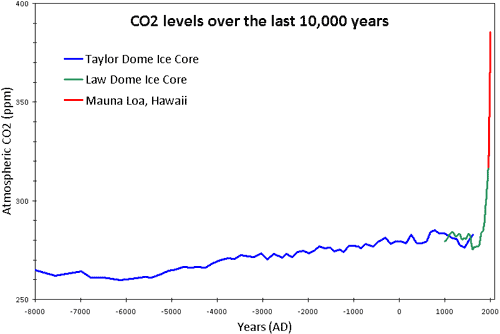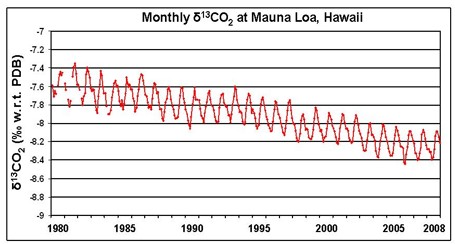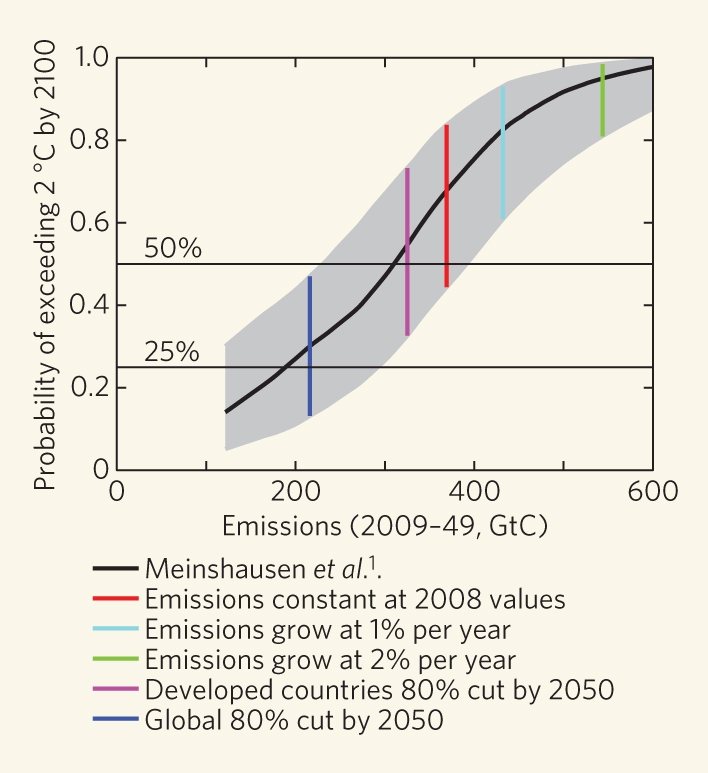Carbon Dioxide - Everyone's Favorite Pollutant
Posted on 5 October 2010 by dana1981
Before assessing whether or not CO2 is a pollutant, we must first define the term.
What is an Air Pollutant?
The US Clean Air Act was incorporated into the United States Code of Federal Regulations, Title 42, Chapter 85. Its Title III, Section 7602(g) defines an air pollutant:
"The term “air pollutant” means any air pollution agent or combination of such agents, including any physical, chemical, biological, radioactive (including source material, special nuclear material, and byproduct material) substance or matter which is emitted into or otherwise enters the ambient air."
Clearly this is a very broad definition. More importantly, its Title 1, Part A, Section 7408 states that the US Environmental Protection Agency (EPA) Administrator must publish a list of certain air pollutants:
"emissions of which, in his judgment, cause or contribute to air pollution which may reasonably be anticipated to endanger public health or welfare"
In Massachusetts v. Environmental Protection Agency (in 2007), the US Supreme Court held that the Clean Air Act gives the EPA the authority to regulate tailpipe emissions of greenhouse gases. Two years after the Supreme Court ruling, in 2009 the EPA issued an endangerment finding concluding that
"greenhouse gases in the atmosphere may reasonably be anticipated both to endanger public health and to endanger public welfare....The major assessments by the U.S. Global Climate Research Program (USGCRP), the Intergovernmental Panel on Climate Change (IPCC), and the National Research Council (NRC) serve as the primary scientific basis supporting the Administrator’s endangerment finding."Greenhouse gases including CO2 unquestionably fit the Clean Air Act's broad definition of "air pollutants," and must be listed and regulated by the EPA if it can be determined that they endanger public heath and/or welfare.
"the addition of any substance (solid, liquid, or gas) or any form of energy (such as heat, sound, or radioactivity) to the environment at a rate faster than it can be dispersed, diluted, decomposed, recycled, or stored in some harmless form."
Is Increasing CO2 Dangerous or Harmless?
Humans are Increasing Atmospheric CO2 Concentrations

Figure 1: CO2 levels (parts per million) over the past 10,000 years. Blue line from Taylor Dome ice cores (NOAA). Green line from Law Dome ice core (CDIAC). Red line from direct measurements at Mauna Loa, Hawaii (NOAA).
We know that the increase in atmospheric CO2 is anthropogenic from a number of lines of evidence. Atmospheric oxygen is decreasing at approximately the same rate as the atmospheric CO2 increase, which tells us that the source of the change is from a release of carbon combining with atmospheric oxygen rather than a natural release of CO2. We also know that the 30 billion tonnes of CO2 released by human activity must go somewhere, and in fact atmospheric CO2 is only increasing by about 16 billion tonnes per year (the rest is going into the oceans). CO2 produced from burning fossil fuels or burning forests also has quite a different isotopic composition from CO2 in the atmosphere, because plants have a preference for the lighter isotopes (12C vs. 13C); thus they have lower 13C/12C ratios. And indeed we've observed this ratio decline in the atmosphere.

Figure 2: Atmospheric 13C ratio as measured at Mauna Loa (CDIAC)
The Increasing CO2 is Causing Global Warming
Thus we know that human emissions are increasing the amount of CO2 in the atmosphere, which as a greenhouse gas, in turn increases the greenhouse effect. This increases the amount of energy (in the form of longwave infrared radiation) reaching the Earth's surface. We've observed this increase through spectroscopy, which measures changes in the electromagnetic spectrum. Climate scientists have also quantified the amount of warming we expect to see from the energy imbalance caused by this increased downward radiation, and it matches well with observations. Given the amount of CO2 humans have added to the atmosphere already, once the planet reaches a new equilibrium state, it will have warmed approximately 1.4°C from pre-industrial levels. Additionally, we have observed numerous key 'fingerprints' of anthropogenic global warming which confirm that the warming we've experienced is due to an increased greenhouse effect.
How Much Warming is Dangerous?
There are some positive effects of global warming from increased CO2 emissions. For example, improved agriculture at high latitudes and increased vegetation growth in some circumstances. However, the negatives will far outweigh the positives. Coast-bound communities are threatened by rising sea levels. Melting glaciers threaten the water supplies of hundreds of millions. Species are already becoming extinct at a rate 100 to 1000 times higher than the “background” rate of long spans of geological time, partially due to the effects of global warming and climate change.
Quantifying exactly at what point global warming will become dangerous is a difficult task. However, based on the research and recommendations of climate scientists, more than 100 countries have adopted a global warming limit of 2°C or below (relative to pre-industrial levels) as a guiding principle for mitigation efforts to reduce climate change risks, impacts, and damages. This 2°C warming level is considered the "danger limit". During the last interglacial period when the average global temperature was approximately 2°C hotter than today, sea levels were 6.6 to 9.4 meters higher than current sea levels. Large parts of the Antarctic and Greenland ice sheets melted, with the southern part of Greenland having little or no ice.
As discussed above, the CO2 we've already emitted has committed us to about 1.4°C warming above pre-industrial levels. Given a climate sensitivity to a doubling of atmospheric CO2 of 2-4.5°C and the fact that on our current path we're headed for a CO2 doubling by mid-to-late 21st century, we're fast-approaching the danger limit.
How Soon Will we Reach Dangerous Warming?
Meinshausen et al. (2009) found that if we limit cumulative CO2 emissions from 2000-2050 to 1,000 Gt (approximately an 80% cut in global emissions), there is a 25% probability of warming exceeding the 2°C limit, and 1,440 Gt CO2 over that period (an 80% cut in developed country emissions) yields a 50% chance of 2°C warming by the year 2100. If we maintain current emissions levels, there is an approximately 67% chance that we will exceed 2°C warming by 2100.

Figure 3: Probability of exceeding 2°C warming by 2100 in various emissions scenarios in gigatonnes of carbon (RealClimate)
In short, to avoid the amount of global warming which is considered dangerous based on our understanding of the climate and empirical evidence, we need to achieve major reductions in global CO2 emissions in the next 40 years. Thus it becomes quite clear that not only is CO2 a pollutant, but it also poses a risk to public health and welfare.
Ocean Acidification
Another impact of increasing atmospheric CO2 emissions is ocean acidification. When CO2 dissolves in seawater, it increases the hydrogen ion concentration though the chemical reaction CO2 + CO32- + H2O ? 2HCO3-, thus decreasing the pH of the oceans (NOAA 2008). Among other impacts, this decreasing oceanic pH has a damaging effect on corals, which form the habitat of approximately 25% of marine species (Karleskint et al. 2009). A seminal study co-authored by 17 marine scientists (Hoegh-Guldberg et al. 2007) found:
"Many experimental studies have shown that a doubling of pre-industrial [CO2]atm to 560 ppm decreases coral calcification and growth by up to 40% through the inhibition of aragonite formation (the principal crystalline form of calcium carbonate deposited in coral skeletons) as carbonate-ion concentrations decrease"
Thus not only does anthropogenic CO2 act as a dangerous pollutant due to its impacts on global warming and climate change, but it also has a major effect on marine ecosystems through ocean acidification.
CO2 is a Pollutant
When considering the legal definition of "air pollutants" and body of scientific evidence, it becomes clear that CO2 meets the definition and poses a significant threat to public health and welfare.
This post is the Advanced version (written by Dana Nuccitelli [dana1981]) of the skeptic argument "CO2 is not a pollutant".































 Arguments
Arguments























 0
0  0
0 Hmm, or maybe it's just that brand ;) Presumably you're posting such ridiculous arguments to expose the stupidity of the so-called sceptic position?
Hmm, or maybe it's just that brand ;) Presumably you're posting such ridiculous arguments to expose the stupidity of the so-called sceptic position?
 It is hard to understand the extent of such problems but I suspect it will be more severe than Chernobyl but less horrible than Bhopal.
Fortunately the scale is much smaller than Chernobyl and the stuff released is also more manageable (even if its sheer volume is enormous). Neither is it nearly as lethal as dioxin pollution at Bhopal. Still, it is bad enough. However, at least the Danube appears to be saved at the moment due to heroic efforts to neutralize pH of sludge.
We will also see to what extent and how fast Mother Nature is able to mitigate the effects by turning Sodium Hydroxide in sludge to baking soda (Sodium Bicarbonate) using atmospheric Carbon Dioxide. Heavy metal contents of the stuff is controversial. Government experts say it is hardly above environmental levels while Greenpeace claims it is extremely toxic. I think the problem may be some of the metals are bound in water soluble complexes now as opposed to their original insoluble state in source rocks.
I still think treating carbon dioxide as a pollutant in a legal context is a silly move. At the philosophical level one can rearrange concepts any way one likes, but the legal battleground is an entirely different matter.
Neither the liability insurance business nor the judical system can cope with emissions where you can't trace down causal links from those responsible for it to actual persons suffering damage using plain common sense or standard expertise. Therefore if actual pollutants, where this procedure is supposed to be straightforward get mixed up with other stuff in legalese, you get laws that are impossible to implement, opening up one of the richest sources of lawlessness this way.
It is hard to understand the extent of such problems but I suspect it will be more severe than Chernobyl but less horrible than Bhopal.
Fortunately the scale is much smaller than Chernobyl and the stuff released is also more manageable (even if its sheer volume is enormous). Neither is it nearly as lethal as dioxin pollution at Bhopal. Still, it is bad enough. However, at least the Danube appears to be saved at the moment due to heroic efforts to neutralize pH of sludge.
We will also see to what extent and how fast Mother Nature is able to mitigate the effects by turning Sodium Hydroxide in sludge to baking soda (Sodium Bicarbonate) using atmospheric Carbon Dioxide. Heavy metal contents of the stuff is controversial. Government experts say it is hardly above environmental levels while Greenpeace claims it is extremely toxic. I think the problem may be some of the metals are bound in water soluble complexes now as opposed to their original insoluble state in source rocks.
I still think treating carbon dioxide as a pollutant in a legal context is a silly move. At the philosophical level one can rearrange concepts any way one likes, but the legal battleground is an entirely different matter.
Neither the liability insurance business nor the judical system can cope with emissions where you can't trace down causal links from those responsible for it to actual persons suffering damage using plain common sense or standard expertise. Therefore if actual pollutants, where this procedure is supposed to be straightforward get mixed up with other stuff in legalese, you get laws that are impossible to implement, opening up one of the richest sources of lawlessness this way.







Comments